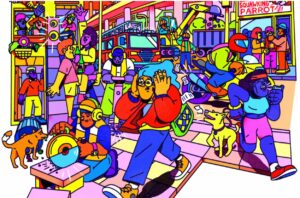From The Guardian: “Shortly after I sat down to read up on the auditory and non-auditory effects of noise on health in the Lancet, the drilling began – an angry, jagged, intermittent frenzy of metal on plaster. Our downstairs neighbours have been refurbishing their flat for the past eight weeks or so, removing ceilings, walls and any domestic contentment for us upstairs.
So, I went to a cafe. The espresso machine and staff training session I could bear. It was the three-year-old running around screaming that finally made me flee. So I went to the library. Remember when the thing about libraries was that you had to zip it? Now they play host to an everlasting Hop Little Bunnies music session. ‘They’re so still … are they ill …’ Argh!
I never wanted to be the sort of person who got angry about noise. But there is something about noise that turns you into that person. One of the things that prompted our family to move from London to Bristol was our then three-year-old walking down our old road (Green Lanes in Haringey) going: ‘It’s so noisy!’ It’s not simply that noise accelerates the grumpification process. It is a pollutant, with well-established effects on multiple aspects of physical and mental health, from cardiovascular disease to depression.
‘There’s consistent evidence that road traffic noise leads to heart attacks,’ says Dr Yutong Samuel Cai, an epidemiologist at Imperial College London. He recently analysed the health data of 356,000 people in Britain and Norway and found that long-term exposure to traffic noise affects our blood biochemistry, over and above the effects of exhaust fumes . . .
The World Health Organization has calculated that at least one million healthy life-years are lost every year in western European countries because of environmental noise, with cardiovascular disease contributing to the vast majority of these deaths, especially high blood pressure, heart attacks and coronary heart disease. It is thought that noise triggers the release of the stress hormone cortisol, which damages blood vessels over time. Humans evolved our acute hearing millions of years ago, when we were prey animals and had to pinpoint predators, so it is no wonder we find noise stressful. It is hardwired . . .
Noise exposure has also been linked with cognitive impairment and behavioural issues in children, as well as the more obvious sleep disturbance and hearing damage. The European Environment Agency blames 10,000 premature deaths, 43,000 hospital admissions and 900,000 cases of hypertension a year in Europe on noise. The most pervasive source is road-traffic noise: 125 million Europeans experience levels greater than 55 decibels – thought to be harmful to health – day, evening and night.
. . . Cai, who conducted the Imperial study into road-traffic noise and health, stresses that one compounding factor is inequality. Houses next to busy roads tend to be cheaper . . . We live in a world where peace and quiet is increasingly a luxury item and noise and stress are baseline conditions for the disadvantaged.
‘In the past two or three years, the links between noise pollution and mental health are becoming clearer,’ says Cai . . . He points to a 2015 German study that found that people living next to noisy roads were 25% more likely to have symptoms of depression than people in quieter areas, even when adjusting for socioeconomic factors. As Kate Pickett and Richard Wilkinson demonstrate in the book The Inner Level, pretty much any social problem worsens the more unequal a society is. US studies have shown that the more economically divided and racially segregated a city is, the louder it is for everyone – even the comparatively advantaged. It’s also true that the more disadvantaged you are, the louder your life will be, creating what researchers term a ‘double jeopardy’ effect.”
***
Back to Around the Web












